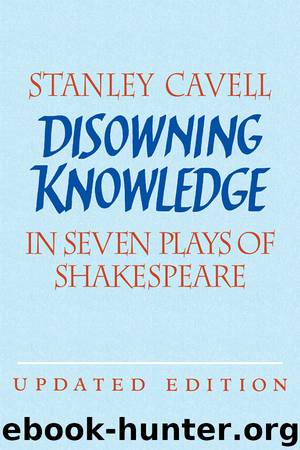Disowning Knowledge: In Seven Plays of Shakespeare by Stanley Cavell

Author:Stanley Cavell
Language: eng
Format: epub
Publisher: Cambridge University Press
Published: 1987-02-27T16:00:00+00:00
* * *
1 ‘King Lear and the Theory of the Sight Pattern,” in R. Brower and R. Poirier, eds.. I// Defense of Reading (New York: Dutton, 1963), pp. 133–52.
2 Alpers gives the references for the elements of his quotation as follows: J. I. M. Stewart, Character and Motive in Shakespeare (New York: Longman, Green, 1949), pp. 20–1; R. B. Heilman, This Great Stage (Baton Rouge: Louisiana State University Press, 1948), p. 25; L. C. Knights, Some Shakespearean Themes (London: Chatto and Windus, 1959), p. 107; King Lear, ed. K. Muir (Cambridge: Harvard University Press, 1952, Arden edition), p. lx.
3 This of course is not to say that such critics have correctly interpreted this feeling of insight, and it does not touch Alpers’s claim that such critics have in particular interpreted “moral insight” as “the perception of moral truths”; nor, finally, does it weaken Alpers’s view of such an interpretation as moralizing, hence evading, the significance of (this) tragedy. 1 am not, that is, regarding Alpers and the critics with whom, on this point, he is at odds, as providing alternative readings of the play, between which I am choosing or adjudicating. Their relation is more complex. Another way of seeing this is to recognize that Alpers does not deny the presence of a controlling “sight pattern” in King Lear but that he transforms the significance of this pattern.
4 See the introduction by Peter Laslett to his edition of Filmer’s Patriarcha (Oxford: Black well Publisher, 1949).
5”King Lear and the Comedy of the Grotesque,” one of the studies composing The Wheel of Hire, originally published by Oxford University Press, 1930; published in the fifth revised edition by Meridian Books, New York, 1957.
6 Suggested by R. W. Chambers, King Lear, 1940; cited by Muir, p. 1.
7 The passage from this sentence to the end of the paragraph was added as the result of a conversation with Rose Mary Harbison.
8 New York: Barnes and Noble, 1966; the quotation that follows is from pp. 181–2 of this edition. The book was first published in 1930 by Cambridge University Press.
9” Professor Jonas Barish – to whom 1 am indebted for other suggestions about this essay as well as the present one – has pointed out to me that in my eagerness to solve all the King Lear problems 1 have neglected trying an account of Kent’s plan in delaying making himself known (“Yet to be known shortens my made intent” [IV, vii, 9|). This omission is particularly important because Kent’s is the one delay that causes no harm to others; hence it provides an internal measure of those harms. I do not understand his “dear cause” (IV, iii, 52), but I think the specialness of Kent’s delay has to do with these facts: (1) It never prevents his perfect faithfulness to his duties of service; these do not require – Kent does not permit them to require -personal recognition in order to be performed. This sense of the finitude of the demands placed upon Kent, hence
Download
This site does not store any files on its server. We only index and link to content provided by other sites. Please contact the content providers to delete copyright contents if any and email us, we'll remove relevant links or contents immediately.
Still Me by Jojo Moyes(11266)
On the Yard (New York Review Books Classics) by Braly Malcolm(5525)
A Year in the Merde by Stephen Clarke(5431)
Eleanor Oliphant Is Completely Fine by Gail Honeyman(5282)
The Bookshop by Penelope Fitzgerald(3854)
How Music Works by David Byrne(3272)
Surprise Me by Kinsella Sophie(3114)
Pharaoh by Wilbur Smith(2993)
Why I Write by George Orwell(2955)
A Column of Fire by Ken Follett(2614)
Churchill by Paul Johnson(2587)
The Beach by Alex Garland(2562)
The Songlines by Bruce Chatwin(2557)
Aubrey–Maturin 02 - [1803-04] - Post Captain by Patrick O'Brian(2306)
Heartless by Mary Balogh(2259)
Elizabeth by Philippa Jones(2206)
Hitler by Ian Kershaw(2199)
Life of Elizabeth I by Alison Weir(2086)
Harry Potter and the Cursed Child by J. K. Rowling & John Tiffany & Jack Thorne(2066)
